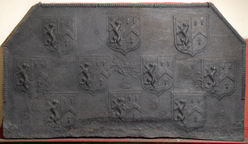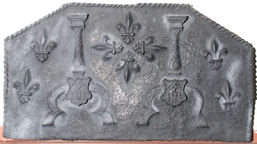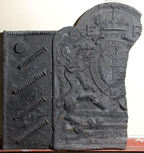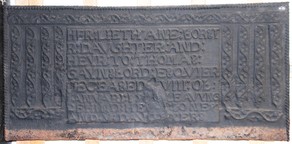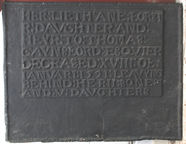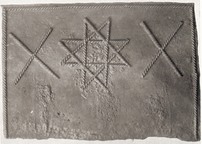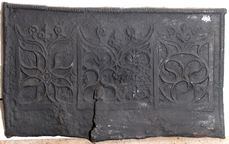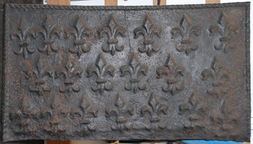-
388
Description: Rectangular, with canted top corners; twisted rope edging (top and sides only); ten shields of Ayloffe impaling Sulyard in three rows, 3-4-3; Ayloffe: sable, a lion rampant Or, collared gules, between three crosses formy of the second; Sulyard: argent, a chevron gules between three pheons inverted sable.
Notes: William Ayloffe (c1535-1584) of Bretons, Hornchurch, Essex, Justice of the Court of Queen’s Bench, married (c1560) Jane, dau. of Sir Eustace Sulyard, of Runwell, Essex. Formerly part of the J. H. Every collection.
Arms: Ayloffe impaling Sulyard (William Ayloffe of Bretons, Hornchurch)
- Decoration tags:
- rectangular with canted top corners (shape)
- rope (edging)
- carved stamps
- armorial
Manufactured: in the early-17th century possibly in the Weald area of England.
Current location: Anne of Cleves House, Southover High Street, Lewes, East Sussex, England.
Museum number: 1944.24.047 (part of the Sussex Archaeological Society museum group)
- Attached to series:
- Ayloffe series
- Personal armorial firebacks
-
393
Description: Rectangular with canted top corners; twisted rope edging all round except base: plain plate with two stamps of an iron firedog with twisted neck and shield bearing letters HN and crossed staples; firedogs have columnar capitals; fleur de lys stamp repeated six times, singly at each end, in star pattern in middle; stamps have twisted wreaths.
Notes: The initials HN probably refer to Henry Nevill, the crossed staples being a badge of the Nevill family. Henry Nevill occupied Mayfield furnace from about 1585 until 1599. One of two variants (see no. 742) with the same firedogs and fleurs-de-lys; other firedogs in a very similar style are known. Formerly at Holmbush Farm, Hellingly, Sussex.
Inscription: HN HN
- Decoration tags:
- rectangular with canted top corners (shape)
- rope (edging)
- simple stamps
- carved stamps
- heraldic
- text
- objects
Manufactured: in the late-16th century possibly at Mayfield Furnace in the Weald area of England.
Current location: Anne of Cleves House, Southover High Street, Lewes, East Sussex, England.
Museum number: LH000.902 (part of the Sussex Archaeological Society museum group)
Citation: Anon., 30 Dec 1911, 'Sussex Backs and their Story', The Ironmonger.
Citation: Dawson, C., 1903, 'Sussex Iron Work and Pottery', Sussex Archaeological Collections, 46, pp. 1-54.
Citation: Gardner, J. S., 1898, 'Iron Casting in the Weald', Archaeologia, 56, 1, pp. 133-164.
-
403
Description: Fragment; arched rectangular shape with rounded corners; ovolo within fillet moulding all round; oval Tudor royal shield with garter surrounding, topped with a royal crown; dragon and (missing)greyhound supporters; initials split by crown; inscription on a fillet between legs of supporters, behind garter finial; motto on an Ionic plinth at bottom; rectangular side panels with twisted rope edging top and side; a short length of turned dowel stamped four times, diagonally, on each panel; a circular disc with concentric grooves in top left corner.
Notes: Similar to a fireback in the Victoria & Albert Museum, but differentiated by the twisted rope edging of the side panel and the addition of the grooved disc. The disparity between the worn surface of the armorial panel and the greater clarity of the extensions indicates that the extended casting was made using an already well-used armorial fireback and therefore at a substantially later date.
Inscription: E R / HONY SOIT QUE ... / Made in Sussex by J... / DV ET MOV...
Arms: Tudor royal - Edward VI
- Decoration tags:
- rectangular with round arch (shape)
- rope (edging)
- simple stamps
- carved stamps
- whole carved pattern
- extension panels
- armorial
- royal
- text
- objects
Manufactured: in the late-16th century in the Weald area of England.
Current location: Anne of Cleves House, Southover High Street, Lewes, East Sussex, England.
Museum number: LH000.916 (part of the Sussex Archaeological Society museum group)
- Attached to series:
- Pounsley series
- John Harvo series
- Tudor royal armorial firebacks
-
431
Description: Rectangular; twisted rope edging (top and sides); undulating vine strip repeated in a line four times along the top, and four times vertically on each side of central inscription panel, with shorter vine strip repeated below vertical strips on each side.
Notes: One of several firebacks that re-use the memorial inscription to 'Ane Forster' (Anne Foster) of Crowhurst, Surrey. The vine strip stamp is seen on other firebacks. The excrescence obscuring part of the text was probably the result of clumsy pouring of the iron during casting which displaced some of the sand mould.
Inscription: HER:LIETH:ANE:FORST / R:DAVGHTER:AND: / HEYR:TO:THOMAS: / GAYNSFORD:ESQVIER / DECEASED:XVIII:OF: / IANVARI:1591:LEAVYNG / BEHIND:HER:II:SONES: / AND:V:DAVGHTERS
- Decoration tags:
- rectangular (shape)
- rope (edging)
- simple stamps
- carved stamps
- carved pattern panels
- planklines
- text
Manufactured: in the late-16th century possibly at Pounsley Furnace, Framfield in the Weald area of England.
Current location: Hall Place, Bexley, Kent, England.
Museum number: LH000.904 (part of the Sussex Archaeological Society museum group)
-
432
Description: Rectangular; twisted rope edging; top centre, inscription panel.
Notes: One of several firebacks that re-use the memorial inscription to 'Ane Forster' (Anne Foster) of Crowhurst, Surrey. Formerly in the John H. Every collection, for which it was purchased in 1921 in Broadway, Worcs., having allegedly come from Billingshurst, Sussex.
Inscription: HER:LIETH:ANE:FORST / R:DAVGHTER:AND: / HEYR:TO:THOMAS: / GAYNSFORD:ESQVIER / DECEASED:XVIII:OF: / IANVARI:1591:LEAVYNG / BEHIND:HER:II:SONES: / AND:V:DAVGHTERS
- Decoration tags:
- rectangular (shape)
- rope (edging)
- carved pattern panels
- planklines
- text
Manufactured: in the late-16th century possibly at Pounsley Furnace, Framfield in the Weald area of England.
Current location: Anne of Cleves House, Southover High Street, Lewes, East Sussex, England.
Museum number: Shoreham 92/1900 (part of the Sussex Archaeological Society museum group)
- Attached to series:
- Pounsley series
- Anne Forster series
- Epitaph firebacks
-
437
Description: Sub-rectangular; twisted rope edging (top and sides); centre, straight length of twisted material (rope or metal) stamped eight times to form an octagram, and twice on each side to form saltires.
Notes: The octagram has magical symbolism, allegedly providing protection against evil; it is more commonly seen on French firebacks. Formerly part of the J. H. Every collection. Illustration from Schubert, 1957.
- Decoration tags:
- rectangular (shape)
- rope (edging)
- simple stamps
- apotropaic
- objects
Manufactured: in the 16th century in the Weald area of England.
Current location: Anne of Cleves House, Southover High Street, Lewes, East Sussex, England.
Museum number: 1944.24.038 (part of the Sussex Archaeological Society museum group)
Citation: Mercer, H. C., 1961, The Bible in Iron (3rd ed. Doylestown, The Bucks County Historical Society).
- Attached to series:
- Rope design firebacks
-
441
Description: Sub-rectangular; edged with a repeated length of helically-turned dowel (top and sides); apparently random arrangement of same piece of dowel repeated ten times, including a saltire and cross.
Notes: Apart from the Christian significance of the cross, the other arrangements of rope lengths may be apotropaic in their purpose, the double V being a possible invocation of the Virgin. The blemishes at the base are caused by the casting sand being disturbed by the pouring of the metal.
- Decoration tags:
- rectangular (shape)
- rope (edging)
- simple stamps
- apotropaic
- objects
Manufactured: in the 16th century in the Weald area of England.
Current location: Anne of Cleves House, Southover High Street, Lewes, East Sussex, England.
Museum number: LH000.799 (part of the Sussex Archaeological Society museum group)
Citation: Dawson, C., 1903, 'Sussex Iron Work and Pottery', Sussex Archaeological Collections, 46, pp. 1-54.
Citation: Gardner, J. S., 1898, 'Iron Casting in the Weald', Archaeologia, 56, 1, pp. 133-164.
- Attached to series:
- Rope design firebacks
-
442
Description: Fragment: right part only; rectangular; twisted rope edging; lion passant with rose stamped twice above and below rear end, crowned rose below fore end; bottom right corner, two small walking figures, one with both arms down, the other with right arm raised.
Notes: One of a series with the same and other stamps.
- Decoration tags:
- rectangular (shape)
- rope (edging)
- carved stamps
- heraldic
- royal
- animals
- humans
- plants
Manufactured: in the mid-16th century in the Weald area of England.
Current location: Anne of Cleves House, Southover High Street, Lewes, East Sussex, England.
Museum number: LH001.005 (part of the Sussex Archaeological Society museum group)
- Attached to series:
- Royal series
-
444
Description: Rectangular; top and side edging formed from the repeated stamping of a short length of twisted rope; three gothic panels arranged horizontally, the centre one wider than the other two, each panel a symmetrical arrangement of tracery patterns with an inverted ogee arch on top incorporating two flowers; a separate fleur-de-lys stamp has been repeated above each panel.
Notes: The panels were probably derived from a dismantled wooden chest or hutch table, c.1500. Their gothic style belies the probable age of the fireback, such chests already being old when their parts might have been re-used. H.R. Schubert (1957, p.259) speculated that this fireback might have been imported from Cleves, where a furnace near Stolberg produced similar castings. That the same panels are on a fireback at Nymans, Handcross (no. 99), makes English manufacture more probable.
- Decoration tags:
- rectangular (shape)
- rope (edging)
- carved pattern panels
- architectural
- objects
Manufactured: in the early- to mid-16th century in the Weald area of England.
Current location: East Grinstead Museum, East Grinstead, West Sussex, England.
Museum number: LH000.796 (part of the Sussex Archaeological Society museum group)
Citation: Butterfield, W. R., 1916, 'Old Wealden Firebacks', The Connoisseur, 46, pp. 197-209.
Citation: Dawson, C., 1903, 'Sussex Iron Work and Pottery', Sussex Archaeological Collections, 46, pp. 1-54.
- Attached to series:
- Gothic panel series
- Furniture stamp firebacks
-
448
Description: Rectangular; twisted rope edging (top and sides); fleur de lys arranged in a pattern of 20, in three rows: 7-6-7.
Notes: A type of fleur-de-lys used on firebacks possibly cast at Pounsley Furnace.
- Decoration tags:
- rectangular (shape)
- rope (edging)
- carved stamps
- heraldic
Manufactured: in the mid- to late-16th century possibly at Pounsley Furnace, Framfield in the Weald area of England.
Current location: Hall Place, Bexley, Kent, England.
Museum number: 1944.24.039 (part of the Sussex Archaeological Society museum group)
- Attached to series:
- Pounsley series
